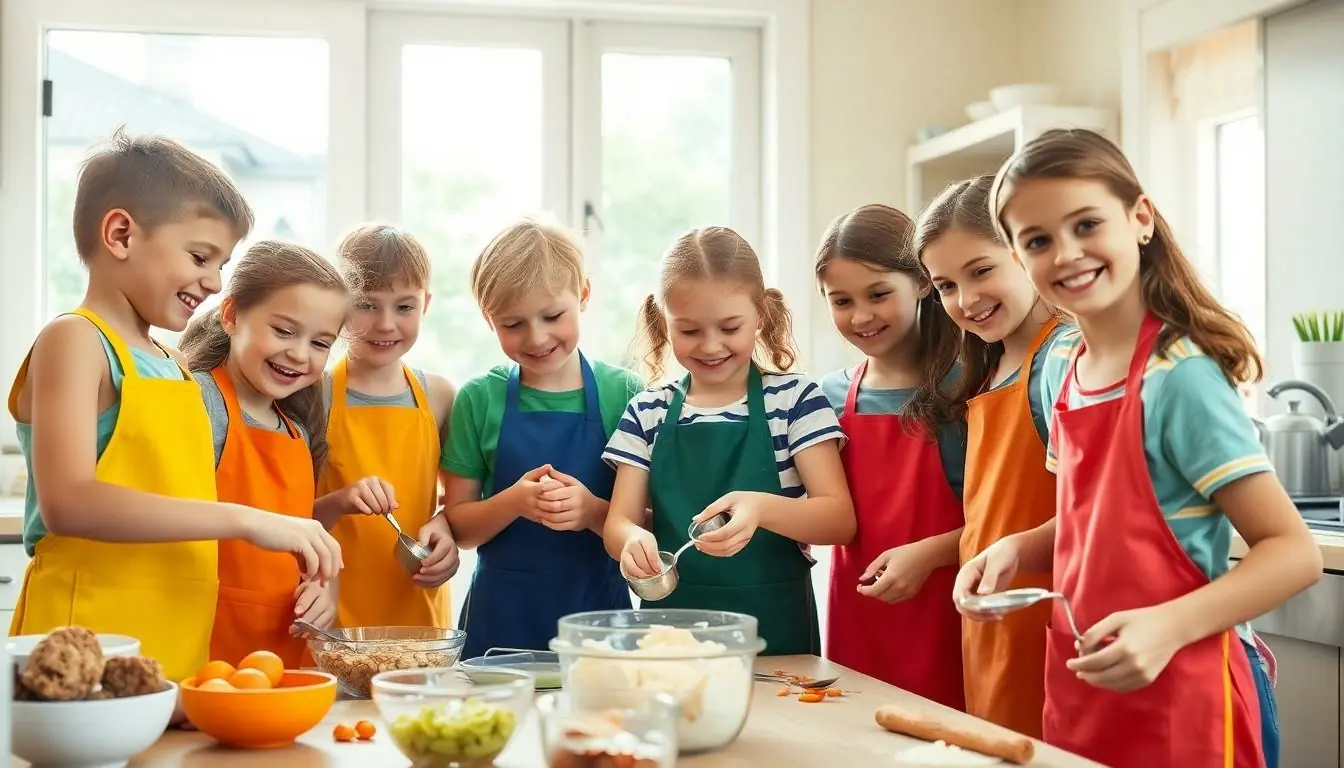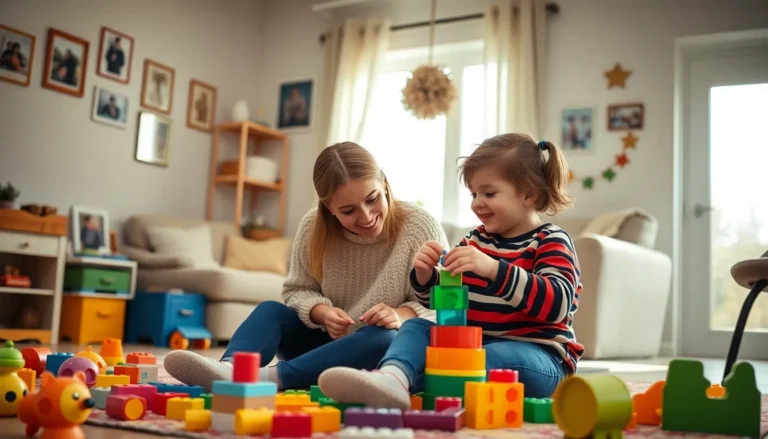Table of Contents
ToggleSummer’s here and kids are ready to trade their textbooks for aprons. What better way to keep their minds sharp and their tummies happy than by enrolling them in a summer cooking camp? These camps are like culinary boot camps for kids, where they can whip up everything from gooey chocolate chip cookies to gourmet pizzas. Plus, they’ll learn valuable skills while having a blast.
Imagine the joy on their faces as they sauté, bake, and chop their way to delicious creations. Not only do these camps teach kids how to cook, but they also inspire creativity, teamwork, and a lifelong love for food. So why not let them unleash their inner chef this summer? With a sprinkle of fun and a dash of learning, summer cooking camps are the perfect recipe for an unforgettable break.
Overview of Summer Cooking Camps for Kids
Summer cooking camps provide children with an engaging environment to explore culinary skills. These camps typically focus on hands-on learning, allowing kids to prepare diverse dishes while gaining practical experience. Participants often work in groups, fostering teamwork and collaboration through shared cooking tasks.
Various camps cover a range of cuisines, from Italian to Asian, helping children discover new flavors and techniques. Many programs also encourage creativity, enabling kids to experiment with ingredients and develop their own unique recipes. Instructors at these camps usually have culinary backgrounds, ensuring that kids learn from knowledgeable experts.
Skill development remains a core component of these programs. Children enhance their culinary skills by measuring ingredients, following recipes, and understanding kitchen safety. They learn valuable life skills such as time management and organization through the cooking process.
Parents often appreciate that these camps promote healthy eating habits. Children gain exposure to fresh ingredients and the importance of nutrition while preparing meals. Engaging in cooking activities can also inspire a lifelong interest in healthy food choices.
Summer cooking camps offer an opportunity for social interaction among peers. Kids build friendships with fellow participants who share similar interests in cooking. This aspect creates a supportive community, offering a balance of education and fun.
Overall, summer cooking camps for kids serve as a beneficial way for children to spend their summer vacation. Through cooking, they not only learn essential skills but also cultivate a passion for food that may last a lifetime.
Benefits of Cooking Camps

Cooking camps provide a unique way for kids to develop essential skills and encourage social interaction with peers. This environment promotes a love for cooking while building expertise.
Skill Development
Skill development remains a primary focus of summer cooking camps. Children learn to measure ingredients accurately, follow recipes with attention, and practice kitchen safety measures. Basic culinary techniques are introduced, making tasks manageable and fun. They also cultivate life skills, such as time management and organization, which transfer easily to other areas. Personalized guidance from instructors helps reinforce understanding of cooking concepts, allowing for gradual progression. This hands-on experience leads to increased confidence, enabling children to tackle more complex dishes as they advance.
Social Interaction
Social interaction thrives in cooking camps, as teamwork plays a significant role in preparing meals. Kids collaborate in groups, sharing ideas and techniques while developing communication skills. Working alongside peers fosters a sense of community and friendship, creating lasting bonds. Campers explore diverse cuisines together, encouraging cultural exchange and appreciation. These interactions promote empathy and support, enhancing emotional development. As friendships form, kids find themselves motivated to engage more fully in the experience, turning cooking into a shared adventure.
Types of Summer Cooking Camps
Summer cooking camps come in various formats, catering to different interests and skill levels. Traditional and specialty camps provide unique experiences for children looking to enhance their cooking abilities.
Traditional Camps
Traditional summer cooking camps focus on teaching foundational culinary skills. Kids learn to prepare classic dishes while gaining essential kitchen techniques. They often engage in group activities that emphasize collaboration and teamwork. Through hands-on cooking sessions, campers explore diverse culinary traditions. Instructors guide children through recipe preparation, allowing them to practice measuring, chopping, and cooking methods. Traditional camps foster a supportive environment, encouraging kids to ask questions and express creativity. As a result, participants gain confidence in their cooking abilities and develop a lasting passion for food.
Specialty Camps
Specialty camps offer unique themes to cater to specific culinary interests. Campers might focus on baking, international cuisines, or healthy cooking. These camps provide targeted instruction from expert chefs, fostering skill development in specialized areas. Kids might engage in baking exquisite pastries or creating authentic ethnic dishes. Interactive sessions enhance understanding of diverse cooking techniques and cultural significance. Specialty camps also allow for experimentation with innovative recipes and presentation styles. As children refine their culinary skills, they enjoy a sense of accomplishment and satisfaction with their creations.
Activities Offered at Cooking Camps
Cooking camps offer a variety of engaging activities designed to enhance culinary skills while ensuring fun. Participants discover more than just recipes; they gain hands-on experience in a collaborative environment.
Cooking Classes
Cooking classes serve as the core component of summer cooking camps. Instructors guide kids through preparing a wide range of dishes, from appetizers to desserts. Each class emphasizes fundamental techniques, such as chopping, sautéing, and baking. As children learn to follow recipes, they develop a deeper understanding of flavor pairings and ingredient substitutions. Groups allow for peer collaboration, fostering creativity and teamwork. Exciting themed classes often include international cuisine, seasonal dishes, or baking challenges, encouraging children to think outside the box while honing their cooking abilities.
Nutritional Education
Nutritional education elevates the cooking camp experience. Kids explore the importance of fresh ingredients and healthy eating habits through engaging lessons. They learn about food groups, portion sizes, and balanced meals. Instructors discuss the benefits of various ingredients, such as fruits, vegetables, and whole grains, nurturing an appreciation for nutrition. Campers participate in activities like meal planning and label reading, enhancing their understanding of food choices. By incorporating nutrition education, cooking camps empower children to make informed decisions about their diets, promoting a lifelong interest in healthy eating.
Choosing the Right Camp
Selecting the right summer cooking camp requires careful consideration of various factors. Start by evaluating the age and skill level of the child. Some camps cater specifically to beginners, while others challenge kids with advanced techniques.
Consider the camp’s focus area. Traditional camps provide a broad overview of cooking skills, while specialty camps focus on specific interests like baking or international cuisines. Parents should assess which type aligns with their child’s enthusiasm and goals.
Explore the camp’s schedule and duration. Camps that last several weeks often offer a more comprehensive experience. Meanwhile, shorter sessions may fit better into a family’s summer plans.
Research the instructors’ qualifications. Experienced chefs and educators enhance the learning experience, ensuring children receive accurate and safe guidance. Check reviews from previous attendees for insights into the camp’s reputation and effectiveness.
Inquire about the camp’s facilities. A well-equipped kitchen with ample space allows children to explore culinary creativity. Safety measures should also be a priority, ensuring that all cooking activities occur in a secure environment.
Observe the camper-to-instructor ratio. Smaller groups generally provide more individualized attention, facilitating better skill development. It also enhances social interactions, as kids engage more with both instructors and peers.
Lastly, evaluate the cost. Camp fees can vary widely, so determining the budget beforehand helps narrow down options. Consider what is included in the price, such as meals and materials, to ensure value for the experience offered.
By carefully assessing these factors, parents can choose a camp that supports their child’s culinary journey while providing an enjoyable summer filled with creativity and learning.
Summer cooking camps offer a unique opportunity for children to explore their culinary interests while developing essential life skills. By engaging in hands-on activities and collaborative projects, kids not only learn to cook but also build friendships and enhance their teamwork abilities.
These camps encourage creativity and foster a love for healthy eating through exposure to fresh ingredients and nutritional education. As children refine their culinary skills under the guidance of experienced instructors, they gain confidence that extends beyond the kitchen.
Choosing the right camp can make all the difference in ensuring a fulfilling summer experience. With the right environment and support, kids can embark on a delightful culinary journey that lasts a lifetime.




